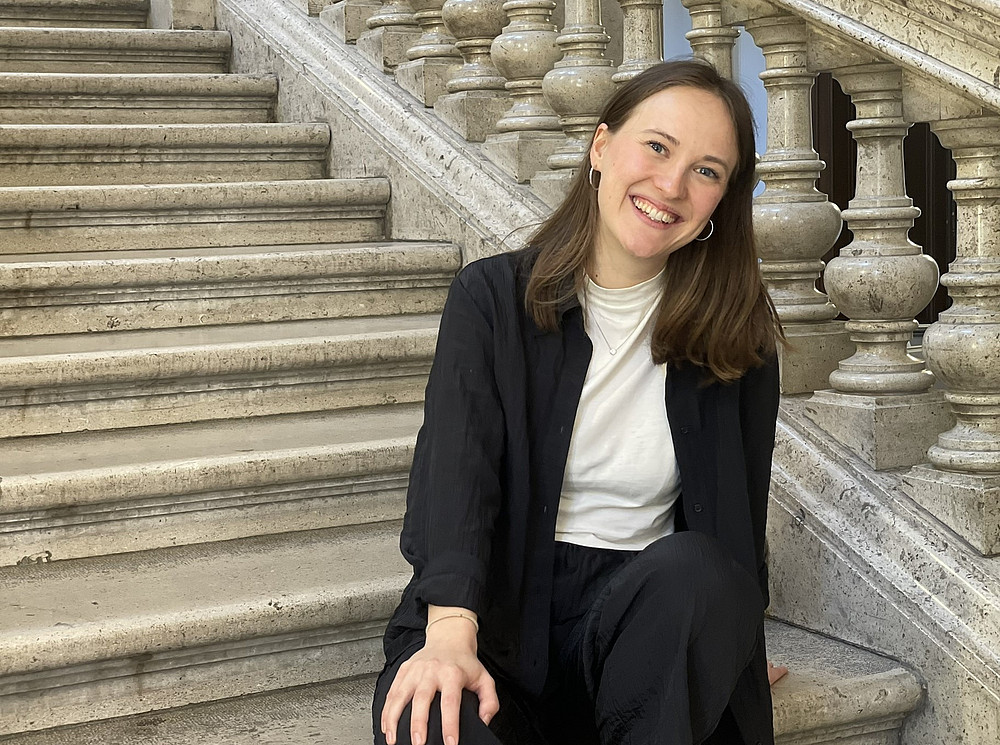"Just doing research in a quiet little room wouldn't be my thing!"

As part of her dissertation, language didactics expert Victoria Reinsperger is researching how written argumentation can be better taught to pupils. She is driven by the feeling that she can give young people something to take with them. And the desire to come to her own conclusions.
Victoria Reinsperger is passionate about argumentation, especially argumentation in written texts. She not only wrote her thesis on this topic, but is also currently researching it for her dissertation. She describes argumentation as a "double-edged sword". "On the one hand, it is so relevant for educational success and so important for social participation. And on the other hand, it's so difficult." This is because arguing requires the acquisition of new content knowledge, the appropriate use of language to persuade others and at the same time the development of cognitive skills, such as the ability to adopt different perspectives, which are necessary for writing and arguing.
It was only natural that Victoria Reinsperger took a particular interest in writing didactics during her teacher training in German studies and psychology/philosophy at the University of Graz. After all, she discovered her passion for writing at an early age. "Writing - and the promotion of writing - has always been important to me. As a child, I wanted to be a journalist."
She "slipped into" the subject of German as a second language when she was working as a language assistant in Menorca in 2017. "That paved the way," she says. And she also "stumbled into" her research project by chance. As part of her work at the Center for Didactics of German as a Second Language and Language Education, she was involved in the Erasmus+ project "DiaLog ", which ran from 2020 to 2023. The aim was to help learners of German to develop their argumentation skills based on controversial questions about climate change. The didactic approach developed in the project aims to provide students with a linguistic tool. At the same time, they should be encouraged cognitively by encouraging them to adopt and contribute perspectives other than their own. This enables them to participate in society.
There is a lot of empirical evidence that it is helpful for students to discuss a topic orally in dialogue if they are then asked to write argumentatively, emphasizes Victoria Reinsperger. What is questionable, however, is how exactly should the oral task arrangement be designed so that students benefit from it in particular? To find this out, she is investigating both the didactic setting MonoDiaLog, in which students argue from their own perspective, and MultiDialog, in which they take on different perspectives in the course of role-playing games. She wants the content to be as realistic as possible for the students. That's why she has them discuss controversial issues relating to climate change - such as fast fashion or whether meat produced in laboratories can be an alternative. "We hope that the students will be able to transfer their argumentation skills to new topics," emphasizes Victoria Reinsperger. What motivates her in particular? "We can help the students to argue and work out solutions together. You often get the feeling that someone has taken something away with them. That's touching and rewarding."
What drives her in her work? "As a researcher, you need a lot of discipline because you work on the same topic for a long time - and also a high tolerance for frustration if an approach doesn't work. It's particularly nice when you get to the point where you manage to slowly penetrate the subject you've been working on for so long, locate your own work and come to your own conclusions."
And she would like one thing above all: "An even stronger practical focus. I would like to dock onto the school because I love teaching." She can pursue this passion in her courses at the university. "The exchange with students is very important to me. Just doing research in a quiet little room - that wouldn't be my thing!"
